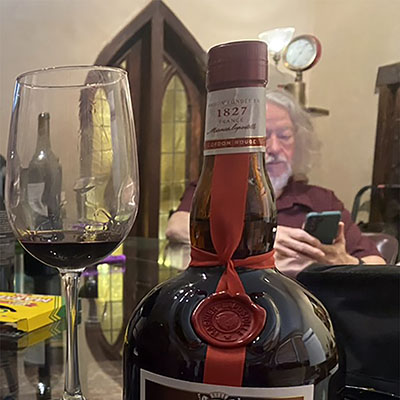The wizard texted
the most knowledgeable tech-scientists within his circle of friends.
“I’m quoting a few people in the rabbit hole on Monday.
I’d like you to be one of them: What is your read on this internal Google memo?
1: is it real, or propaganda?
2: What are the implications?”
These are a few of their answers:
“Oh yeah it’s legit. Whether they know it or not. The implications of Ai are profound. At least as big as the internet was. Probably bigger. Also very different.” – T.M.
“It’s real. The concern is that the control of information was previously centralized to Google Servers. That gave them their ad business. When people run these AI bots on their own devices and will be able to train them in their own Google loses their advantage. There is no reason an Ai bot could be trained on every MondayMorningMemo ever, every ad you ever wrote, all your favorite books, etc. and not continue to write MMM for eternity. It’s getting really close.” – B.E.
“Wasn’t it inevitable that Google’s girth would be its undoing? This memo’s warnings seem reminiscent of sentiments we’ve seen before in industries struggling against disruptive innovation. Reminds me of something I learned during my high school physics class: ‘Closed systems are marked by increasing entropy.’ Open systems are better because they mimic nature. Another thought: this shit is getting real.” – C.M.
“There is a lot here to digest.
I agree with the premise that what is happening with Ai will upend many businesses.
That said, what is missing is the discussion on the data source. Google made ad money on indexing the internet better than anyone, with a simple search interface. Facebook has a slight advantage because people confess their data in exchange for a feeling of connection. More personalized data is a huge asset.
But most commercial enterprises and governments have dark data hidden in silos. So it may be easy to train models, but without the source content, Ai is of not much value.
Microsoft may be the dark horse. With their SharePoint app and Office suite, Ai makes finding, verifying, tagging, and useful information easy.
There is more to share, but the take out order just arrived, and I must dash home to smile at Renee.” – A.D.
“To answer your specific questions:
-
I don’t know if it’s real or not, but I can believe that a Google engineer would have these beliefs, and I think these observations came from someone who has deep knowledge of Ai, and the competitive landscape of it.
-
I don’t agree with all of their assumptions. Engineers behave as if everyone has the same technology savvy that they have.
Based on my experience with open-source software over the past 20+ years, I have found that open-source software has served as the backend code for all sorts of closed source front ends. Most of the internet runs on Linux (alongside Apache, MySQL and PHP – all open source projects). And even though it’s free, Linux on the desktop still runs on less than 3% of computers worldwide.
Many of the best and most used open-source software have been co-developed by the crowd, and some big company (or foundation) providing a bunch of additional labor. Prominent examples of this are Apache, the server software that runs most of the internet, and Open Office, which was originally created by Sun as an attack on Microsoft office, which at the time was Microsoft’s biggest profit center. There are many others.
Open-Source software typically has terrible usability. It’s typically designed by engineers who have no (or little) training in computer usability or computer human interaction. This is its Achilles heel.
I would not be at all surprised if the Open-Source community has huge impacts on Ai development, that will push the technology forward, faster and more efficiently than MS or Google could do on their own.
I can foresee that we will be running all sorts of Ai models that run locally on machines, and run without having to be connected to the internet, that run open-source Language Learning Models in the background that learn in their localized settings and are personally optimized for your needs. AND, they wouldn’t have to be always connected to the internet to do this, which is a big advantage. I think it’s likely that open-source software will run in the background on many of these.
AND, I think you need people with a profit motive to bring these tools to humans for easy use, and to specialize them for specific applications.” – V.W.
“If it’s real, and I don’t have any reason to think it’s not, it is a case in point:
if you’re doing that much analysis, your lunch will be eaten by someone that had an idea, built it out, tried it, and is now on their 3rd generation while you’re still writing a memo.” – T.S.
